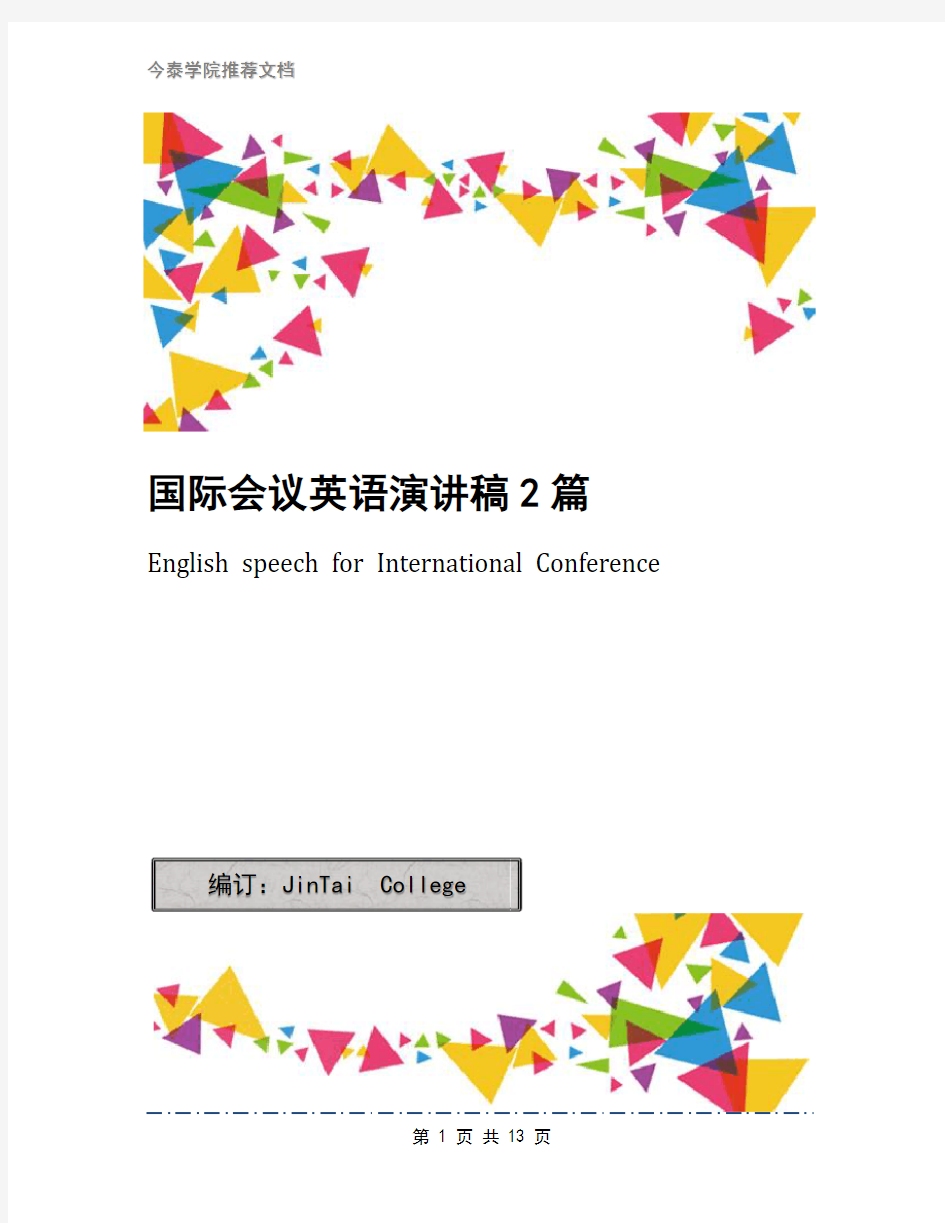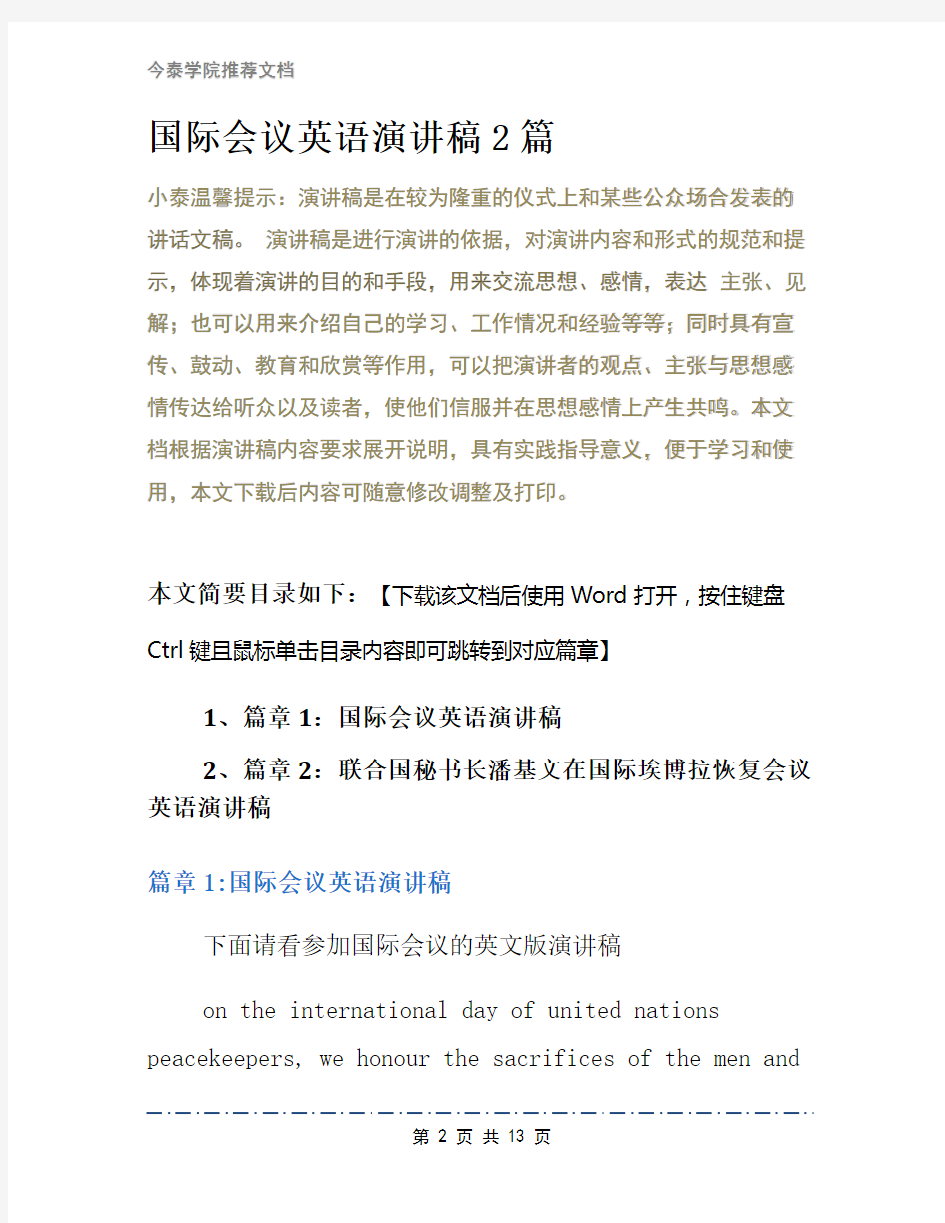

国际会议英语演讲稿2篇English speech for International Conference
编订:JinTai College
国际会议英语演讲稿2篇
小泰温馨提示:演讲稿是在较为隆重的仪式上和某些公众场合发表的讲话文稿。演讲稿是进行演讲的依据,对演讲内容和形式的规范和提示,体现着演讲的目的和手段,用来交流思想、感情,表达主张、见解;也可以用来介绍自己的学习、工作情况和经验等等;同时具有宣传、鼓动、教育和欣赏等作用,可以把演讲者的观点、主张与思想感情传达给听众以及读者,使他们信服并在思想感情上产生共鸣。本文档根据演讲稿内容要求展开说明,具有实践指导意义,便于学习和使用,本文下载后内容可随意修改调整及打印。
本文简要目录如下:【下载该文档后使用Word打开,按住键盘Ctrl键且鼠标单击目录内容即可跳转到对应篇章】
1、篇章1:国际会议英语演讲稿
2、篇章2:联合国秘书长潘基文在国际埃博拉恢复会议英语演讲稿
篇章1:国际会议英语演讲稿
下面请看参加国际会议的英文版演讲稿
on the international day of united nations peacekeepers, we honour the sacrifices of the men and
women who lost their lives while serving under the un flag.
this year's commemoration is a somber one. the past 14 months have been especially deadly for un peacekeeping.
ambushes in in kabul...and a plane crash in haiti...these were among the tragedies that struck peacekeeping last year, killing 121 people.
that toll was nearly matched in a few seconds
with the devastating earthquake that struck haiti last january. the united nations stabilization mission in haiti lost 96 peacekeepers -- the biggest single loss of life in peacekeeping history.
but that dark day also became one of our finest hours, as the men and women of minustah set aside
their own trauma, got the mission quickly back on its feet, and helped the people of haiti cope with the horrific aftermath.
as we honour such moving displays of courage and dedication, we also pay tribute to the more than 122,000 military, police and civilian personnel who serve with distinction in our operations across the world.
their efforts directly help millions of people...
by providing security and promoting reconciliation...
by clearing land-mines and demobilizing combatants...
by strengthening institutions and the rule of law...
by delivering aid and repatriating refugees and displaced persons
by supporting democratic elections, reforming the security sector...
and so much more.
peacekeeping is an indispensable part of the
un’s work for a better world. let us give it the support it needs to succeed.
篇章2:联合国秘书长潘基文在国际埃博拉恢复会议英语演讲
稿【按住Ctrl键点此返回目录】
Thank you, Helen Clark, Administrator of UNDP,
for moderating this very important meeting.
I would like to thank the Presidents of the affected African countries – the President of Guinea,the President of Liberia, and the President of Sierra Leone – and I would also like to thankPresident Mugabe who is participating in his capacity as President of the African Union.
And I would also like to thank Dr. Margaret Chan, Director General of the WHO for herleadership.
Thank you all Ministers and dignitaries who have taken such very valuable time to be with us,to be with the people of Africa particularly affected by Ebola.
I think we can overcome this one, and I think we are now overcoming it but we have to gountil the end, until we see the last patient cured and there will be no further cases.
I would also like to thank the World Bank President, and the IMF Managing Director and themany international and regional development banks,
including the African Development Bankand the Islamic Development Bank, and the European Union.
It is a great honour to have you. Thank you for accepting my invitation to participate and toshow your solidarity for the people affected by this Ebola virus.
Excellence, Mesdames et Messieurs,
Merci de participer à cette conférence internationale sur le relèvement après l'Ebola.
La tache qui nous attend est immense: il s'agit de concrétiser nos promesses de solidaritéconcrete, tournés vers l'action.
Je vous demande de vous joindre à moi pour apporter un soutien durable aux populations despays touchés par l'Ebola.
Let me begin by thanking the many donors who have come together, along with governments,civil society organizations, national and international responders, development banks andfoundations, as part of a broad-based global coalition to support the nationally-led responseefforts.
I applaud the African Union and its plan to convene an International Conference on Africa'sFight against Ebola later this month in Malabo.
I commend the African Union for galvanizing African leaders, businesses and communities
insolidarity with the affected countries. This regional unity has been essential to bringing theoutbreak under control – and will be critical to effective recovery. I commend the morethan 800 African volunteers who deployed through the AU Ebola support mechanism.
I also thank the countries that answered my call to send in logistical support, medical teams,crisis managers and aid for safe and dignified burials.
Thousands of women and men from within and
outside the countries put their lives on the lineto slow the advance of this disease.
Thanks to these partners – and too many others
to name – we have come a long way incontaining the outbreak.
The General Assembly took decisive action, endorsing the UN Mission for Ebola EmergencyResponse – UNMEER. I thank His Excellency Sam Kutesa, President of the General Assembly, forhis continued leadership in keeping the membership seized with this issue.
As UNMEER prepares to close next month, the UN
will maintain the dedicated high-levelleadership under WHO together with the UN country teams, in its support to help the affectedcountries get to zero.
The strategy to end the outbreak is working –
but the final stretch of the response remainsparticularly challenging.
Cases in Guinea and Sierra Leone have been reduced considerably. The response is being fine-tuned to focus on increasing engagement, awareness and contact tracing in the remainingaffected communities.
New cases in Liberia show the need for continued vigilance given the regional risks. TheLiberian Government's proactive actions also underscore how the response strategy haseffectively reinforced national capacities and knowledge to be activated for future outbreaks.
But the impacts of the Ebola crisis have been
far-reaching and much work is needed to supportthe countries.
The outbreak has eroded progress on peace and development. It has disrupted health andsocial services.
Many major economic sectors have been affected: agriculture, mining, trade, tourism,transport, fisheries and livestock. The functioning of schools, hospitals and other publicinfrastructure has suffered.
All of these disruptions have had a negative impact on the economies of all three countries –which were, prior to the Ebola outbreak, on a positive growth trajectory.
This negative impact – on economies, livelihoods and more importantly lives – demands thatthe global community continues to prioritize recovery from Ebola even long after the crisissubsides. This will be essential to “stay at zero” in order to strengthen resilience towithstand future shocks.
Your continued generosity will help the affected countries carry out their plans for recoveryover the next two years.
Our shared goal is to build back stronger, safer and more resilient capacities for preventionand
response. That means access to health services everywhere – not just in capitals. It meanshealth services equipped to not only respond to extraordinary outbreaks like Ebola, but toaddress malaria, cholera and other common ailments.
Investing in Guinea, Sierra Leone and Liberia
will yield global dividends in preventing localoutbreaks from becoming national emergencies and regional pandemics.
That is why today is about more than speeches and pledges – it is a chance to forge apartnership for a better future – a future that is full of opportunity and free of Ebola.
Our task is also to learn from our shortcomings and translate the lessons learned from this crisisin building back better. To do anything less would compound the tragedy.
I particularly welcome WHO's lessons learned process and its plans for reform. Just this week,WHO
welcomed the report from the independent Ebola Interim Assessment Panel. WHO hasindicated that it is already moving forward to implement a number of the
Panel'srecommendations.
In addition, I have appointed a High-Level Panel on the Global Response to Health Crises,headed by His Excellency President Kikwete of the United Republic of Tanzania.
The Panel is now working on the pressing question of how to strengthen national andinternational systems to prevent and manage future health crises. I look forward to itsrecommendations.
More broadly, we have to learn from the Ebola outbreak responding to the crisis phase is notenough. With any outbreak, we have to do more than end the caseload. We must lay thefoundation for true health security by going the extra distance – as we pledge today – tocreate strong health systems that can prevent any recurrence and withstand any futureoutbreak.
Presidents Condé, Koroma and Johnson Sirleaf have shown admirable statesmanship.
Thanks to your support, we can largely be proud
of what we have achieved in responding to thisunprecedented crisis.
Yet we cannot breathe a sigh of relief – instead, let us collectively take a deep breath andresolve to finish the job.
I call on you to be part of this historic push to end the Ebola outbreak in West Africa andsupport the leaders and people of Guinea, Liberia and Sierra Leone in returning to a path ofsustainable development.
Together, let us jumpstart a robust recovery over the next two years, and usher in a betterfuture for generations to come.
Thank you for your support and leadership. Thank you very much.
-------- Designed By JinTai College ---------